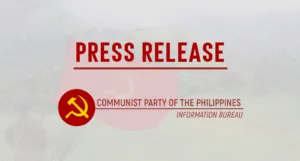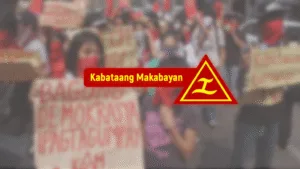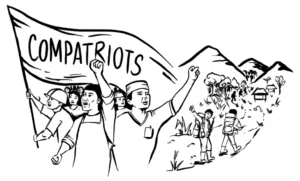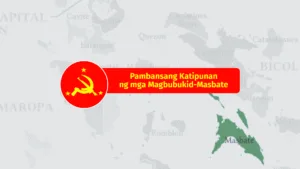Marco Valbuena
Chief Information Officer | Communist Party of the Philippines
September 18, 2023
The price of rice in the Philippines continues to go up because of the confluence of the following key factors:
- rising costs of production mainly due to high land rent, as well as high interest rates on capital, and high costs of imported fertilizers and other farm input;
- steady decline or stagnant output in production due to backward means of production (small scale production, largely manual and use of farm animals, lack of irrigation and farm machinery)
- manipulation of supply and prices by big bourgeois comprador rice cartels who control a large part of local rice supplies, engage in hoarding and large-scale rice smuggling behind the veil of importation
The key and ultimate solution to high prices of rice is implementing genuine land reform in order to end tenancy which is especially prevalent in ricelands. Landlessness is the basic condition under which palay farmers are subject to feudal and semifeudal exploitation. Wealth accumulated through collection of rent based on land monopoly is the biggest impediment to raising productivity.
Land rent (typically in the form of 50-50, 70-30 or even 90-10 “crop-sharing” in favor of the landlord) is one of the single biggest expense which comprises at least 30-50 percent of cost of production of palay farmers. It accrues to landlords who make zero contribution to production. By reducing or eliminating land rent, land reform will help raise income of rice farmers, and in turn, raise the returns of palay farming, creating conditions and motivation to intensify, or improve production to increase yield.
As proven by the Masagana 99 debacle of the 1970s, introducing new technologies without genuine land reform will only end in failure, at the expense of palay farmers. Marcos made false claims last week that agricultural technologies (particularly those being developed at the International Rice Research Institute, and the Mariano Marcos State University) will solve the country’s rice problems. These only serve as sales pitch for the “golden rice” varieties being developed under the auspices of foreign finance capital, including the Bill and Melinda Gates Foundation. The push for so-called “high yielding varieties” will only tie rice farmers to commercial seeds and expensive input.
With genuine land reform, individual rice farmers who own their land can further raise production through cooperative farming and introduction of machinery. Production and income can further be boosted by lowering costs of other farm input and setting minimum farm gate prices through state subsidies (for loans, insurance, and others) and arrangements with commercial interests.
Land reform must be combined with national industrialization to raise the country’s capacity to produce fertilizers and other agricultural input, as well as machines for mechanization. The absence of genuine land reform and national industrialization are the key reasons why the country remains backward and agrarian, unable to sufficiently produce food and other necessities, and dependent on imports.
Price controls ordered by Marcos and subsidizing retailers are token measures mostly serving PR purposes. It obscures the factors behind high prices. It passes the blame of high prices to end retailers (mostly small- and medium-sized store owners), while cartels manipulating supplies and prices are left untouched. Cartels will only hoard their supplies and wait until government subsidies dry up and Marcos’ price controls are lifted.
Without accompanying measures to ensure minimum farm gate prices of palay, Marcos’ price controls will only push down further the buying prices of palay to the detriment of small palay farmers who are being further pulled to the brink of bankruptcy.
Marcos’ economic managers and some politicians representing the interests of big cartels insist that prices can be brought down by removing tariffs to increase imports. This will only serve give big bourgeois compradors more power to manipulate prices, causing even greater losses and bankruptcy to palay farmers.
Land reform and national industrialization are the key components of the national democratic program that aims to address the Filipino people’s aspirations for a progressive and modern economy, alongside social justice and national freedom.











